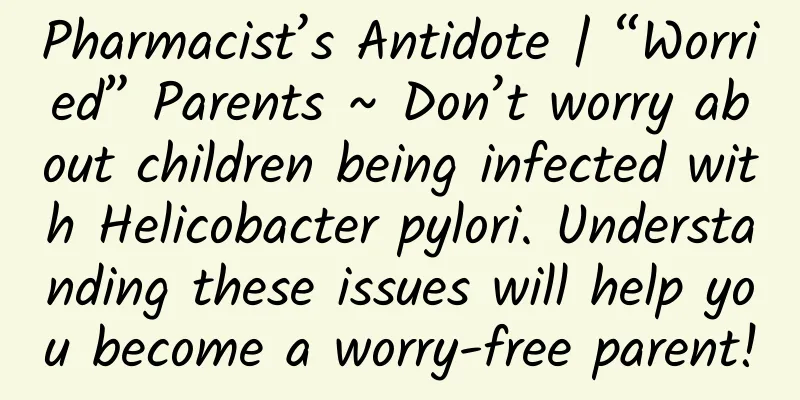Pharmacist’s Antidote | “Worried” Parents ~ Don’t worry about children being infected with Helicobacter pylori. Understanding these issues will help you become a worry-free parent!

|
Helicobacter pylori (Hp) is a spiral-shaped bacillus that colonizes the human gastric mucosa. Studies have confirmed that it is the main cause of peptic ulcer occurrence and recurrence after treatment. It can also cause gastric cancer and gastric mucosa-associated lymphoid tissue lymphoma. It is clearly listed as a Class I carcinogen by the World Health Organization. Therefore, parents infected with Hp can't help but worry: Will daily kissing and feeding be transmitted to children? If you are infected, do you also want to check your children? If your child is infected, do you want to clear it together with the parents... Don't worry, clarify the following questions and teach you to let go of the "worry" parent's heart and be a reassuring parent! Question 1: How did children become infected? Some parents wonder, "We pay great attention to hygiene at home, but why do children still get infected with Hp?" We know that Helicobacter pylori is mainly transmitted through oral-oral and fecal-oral routes. If there is an Hp-positive patient at home, eating together without using serving chopsticks, kissing children, parents chewing food to feed young children, using unclean tableware, etc., can all lead to the transmission of Hp. Question 2: If an adult is infected, do children need routine testing? Compared with adults, children infected with Hp have a lower risk of developing serious diseases including peptic ulcer, atrophic gastritis, etc., so routine Hp testing for children under 14 years old is not recommended. However, children need to be tested for Hp if the following conditions exist: ① peptic ulcer; ② gastric mucosa-associated lymphoid tissue lymphoma; ③ chronic gastritis; ④ a first-degree relative with gastric cancer; ⑤ unexplained refractory iron deficiency ischemia; ⑥ plans to take nonsteroidal anti-inflammatory drugs for a long time. Question 3: Which testing method should children choose? At present, urea breath test (UBT) is the most commonly used non-invasive diagnostic method for Hp diagnosis in clinic. Among them, the carbon-13 urea breath test is non-radioactive and suitable for children. It can be used for Hp treatment diagnosis and post-treatment review. It should be noted that, except for serological tests and molecular biological detection methods, acid suppressants must be discontinued for at least 2 weeks, and bismuth and antibiotics must be discontinued for at least 4 weeks before using other methods to detect Hp. Commonly used methods for detecting Hp in children are shown in the following table. Question 4: Is it necessary to eradicate Hp-positive children? Not necessarily! There are many unfavorable factors for eradicating Hp in children, such as less choice of antimicrobial drugs (only amoxicillin, clarithromycin and metronidazole are recommended), low tolerance of children to adverse drug reactions, a certain spontaneous clearance rate of Hp infection in children, and a higher reinfection rate after eradication than in adults. However, eradication can be considered in the following cases: ① chronic gastritis; ② family history of gastric cancer; ③ unexplained refractory iron deficiency anemia; ④ long-term plan to take nonsteroidal anti-inflammatory drugs; ⑤ guardians and older children strongly request treatment. If peptic ulcers or gastric MALT lymphoma occur, eradication is necessary. Question 5: What drugs are commonly used to eradicate Hp in children? Question 6: How to prevent children from being infected with Hp? Preventing transmission within the family is the main measure to prevent children from being infected with HP. The following should be done: wash hands before and after meals; food should be processed at high temperatures; eat separately, or use serving chopsticks and spoons; prohibit mouth-to-mouth feeding; do not eat raw or too hot food, etc. |
<<: Hitwise: More than 50% of adult Internet users in the United States regularly use Facebook
Recommend
What to do if women have menstrual pain
Dysmenorrhea is quite painful for a woman. Althou...
Can women have a vasectomy?
Perhaps we have all heard of sterilization in our...
Preventing stupidity as you age? Choosing more colorful fruits and vegetables can reduce the risk of cognitive decline in the elderly by 20%!
As people age, their cognitive abilities decline,...
Why can't the old leaves of the golden diamond stand up straight? How to plant the golden diamond so that it grows vigorously?
Golden Diamond is a common plant in life. Many fa...
What happened if my period is delayed for more than 20 days?
Nowadays, with the development of social economy,...
There are reasons why white-collar women enter menopause too early
In the gynecological clinics of some hospitals, w...
The fetal heart rate monitor cannot hear the fetal heartbeat
A fetal heart monitor is an instrument for detect...
What does mangosteen mean in love? What should I do if there is yellow inside when I open the mangosteen?
Mangosteen is a tropical fruit. When ripe, the pe...
Latest information: The Delta strain that hit Nanjing is four times more infectious than the original strain
Written by: Caicai, Idobon Original title: "...
What medicine is effective for less dark menstruation?
When abnormalities are found during menstruation,...
What to do if you have a fungal infection
Fungal infection is a common gynecological diseas...
What are the functions and uses of food additive citric acid? Is citric acid soluble in ethanol?
Citric acid is an important organic acid, also kn...
[Smart Farmers] World Allergy Day丨How to avoid allergies from what you eat?
People will come into contact with a variety of f...
Specific treatment for uterine fibroids
When it comes to uterine fibroids, people may thi...









